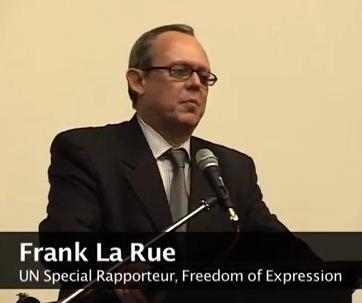The UN Special Report on the promotion and protection of the right to freedom of expression expresses concern about the restriction of freedom of expression

The present Act increased the penalties for defamation in respect of journalists. These fines can exceed 500 000 DA. Mr. La Rue noted in his report at the end of the mission and before proceeding to criminal sanctions, that is it essential that an apology or correction printed as a form of compensation could be available.
“Investigative journalism is not guaranteed in a myriad of restrictive laws which hamper the work of a journalist”, he said. Mr La Rue also mentioned the difficulties encountered by journalists with access to information. The restrictions will certainly lead to dissemination of information. Local correspondents are penalized by being blocked, not having access to information. It is the norm in democratic societies to have trust between people and officials. This is guaranteed by the transparency of public activities.
On advertising, Mr. La Rue calls for the establishment of a law governing the allocation of public advertising to prevent favoritism. He argues that freedom of expression, peaceful gathering and association are factors that contribute to building the rule of law, modern state and the easing of tensions within societies.
The Project’s Information Act was passed by a majority, on December 14th 2011, in Parliament by members of the National Liberation Front (NLF), National Rally of Democratic (NRD) and independent deputy, in the presence of the communication Minister, Mr. Nacer Mehal. The project was devoted to the opening of the audiovisual industry in Algeria, given the considerable progress of information technology and communications over the world.
Additionally, it clarified the establishment of an audiovisual regulatory body because of its influence on public opinion. Similarly for the press, a regulatory authority was also established in the formed constitution. It involved the regulation of electronic media in relation to the Internet industry and aid the faster growth of communication and information technologies (NTIC).
The project of the Organic Law on Information was formally advertised and published in the Official Gazette on January 15th, 2012. Various media professionals have challenged the content of this law. Moreover, the Algerian government was quick to respond to the findings in the report of Mr La Rue, indicating that the assessments are a partial report. They suggested that the question of right of assembly and association is not within the mandate of the UN reporter.
The Algerian government, which has initiated a major reform process since the beginning of 2011, in order to consolidate the rule of law, reaffirms its commitment to continue dialog and cooperation with the UN bodies and mechanisms for the promotion and protection of human rights.
By Mohamed Zitouni, Freelance Journalist
